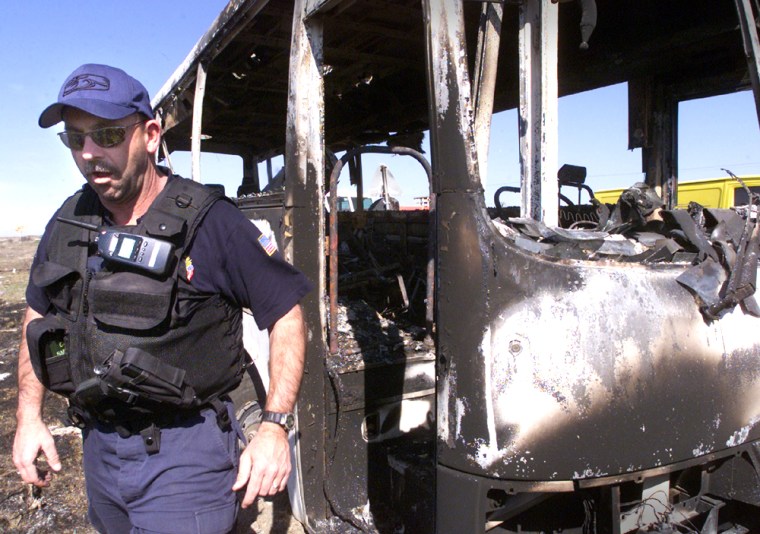NATO-led forces surrounded a key Kosovo town Saturday in efforts to separate ethnic Albanians and Serbs and prevent a resurgence of attacks that killed 28 people and wounded 600, the worst bloodshed in the province since its war ended in 1999.
Thousands of fresh NATO forces began taking up positions late Friday and throughout Saturday in the U.N.-run province after every major city here was hit by riots, arson and gunfights that started Wednesday. It took days for the extent of the violence to become clear, further demonstrating the breakdown of law and order.
The situation appeared to have calmed by midday Saturday, and no incidents were reported overnight, said Derek Chappell, a U.N. police spokesman.
The commander of NATO forces in southern Europe, U.S. Adm. Gregory Johnson, declared that the violence “essentially amounts to ethnic cleansing.” He demanded an end to “mob violence, thuggery and criminal activity.”
“I know in my heart of hearts that all Kosovars are better than this,” he said.
In Moscow, President Vladimir Putin condemned the violence, calling it “ethnic cleansing” and adding that protection must be given to Kosovo’s minority Serbs. Russia has strong cultural ties to the Serbian people, sharing the Orthodox religion and Slavic roots.
“Russia can’t watch indifferently what’s happening there,” Putin told top officials at a regular meeting shown on state-run TV on Saturday. “It’s also acknowledged by our Western colleagues as nothing but ethnic cleansing, and there should be a suitable tough reaction in this situation to protect Serbs.”
Russia’s parliament on Friday passed a resolution condemning the failure of international organizations to stem the violence in Kosovo and said military forces from Serbia-Montenegro’s government should be allowed to help defend the Serbs.
Deep divisions linger
Though riots abated, ethnic Albanians on Saturday looted villages and apartments abandoned by Serb civilians. Some 110 homes and at least 16 Serb Orthodox churches were destroyed by arson.
The continuing violence underscored the divisions that have polarized Kosovo’s majority of mostly Muslim ethnic Albanians, who want independence from Serbia, and Orthodox Christian Serbs who consider the province their ancestral homeland.
Serbia’s Prime Minister Vojislav Kostunica said a division of the province along ethnic lines was the only long-term solution for the region. Kosovo’s prime minister, Bajram Rexhepi, rejected the proposal.
Rexhepi and other ethnic Albanian leaders urged their people to end the protests but did not directly condemn attacks on Serbs.
Unable to provide a secure environment, NATO gathered Serbs and sheltered them on bases across the province. The peacekeepers created makeshift camps for Serb evacuees, but the threatened minority insist the time had come to abandon hope of ever living together in Kosovo with the ethnic Albanians.
NATO boosts force
Trying to get a grip on the situation, NATO bolstered its 18,500-member peacekeeping force with reinforcements from Austria, Britain, Denmark, Germany, France, Italy and the United States, urging restraint in Kosovo and elsewhere in the turbulent Balkans.
Peacekeepers ringed the divided town of Kosovska Mitrovica on Saturday and blocked a main north-south road that leads to the town. The violence started here Wednesday, when ethnic Albanians, blaming Serbs for the deaths of two children, began rampaging in revenge. The ensuing violence reignited long simmering tensions between Serbs and ethnic Albanians that have spilled beyond Kosovo’s borders.
The collapse of order triggered the worst violence since the Kosovo war that killed about 10,000 people, mostly ethnic Albanians. That conflict ended in 1999 after NATO airstrikes halted former President Slobodan Milosevic’s brutal crackdown on secessionist ethnic Albanian rebels.
The province is U.N.-administered but remains part of Serbia-Montenegro, the loose federation of the states remaining after the Balkan wars — driven by Milosevic — that broke apart Yugoslavia.
Kosovo’s final status is to be decided by the United Nations. Ethnic Albanians are frustrated that the international officials who rescued them from Milosevic’s tyranny have failed to deliver independence.
